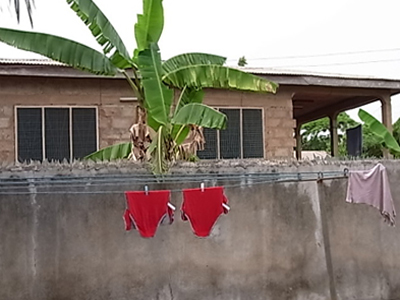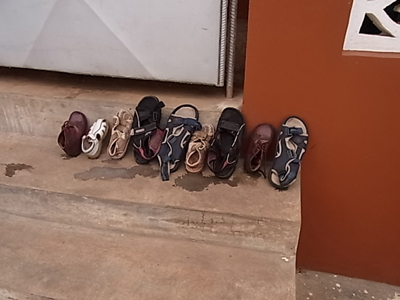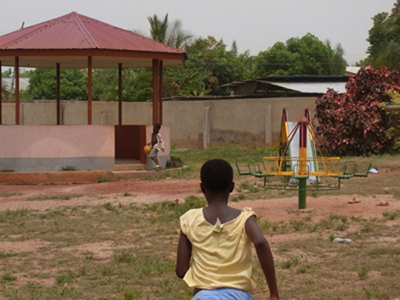TWO DOWNLOADS ABOUT ALAFYA
MISSION STATEMENT
The Organization is a non-profit Organization (NGO), based on Christian values: -The love of God for all; John 3:16. -The Compassion Jesus Christ showed for children; Mark 10:13,14. - The Teaching Pure religion is to look after orphans and widows in their distress: N.T., James 1:27a.
Target groups: -Orphans -Other vulnerable children (OVC´s) -Widows
The main Aim of the Alafya Foundation is to support children in the target groups, providing the basic necessities of life in a homely environment, so that they can grow up and develop into responsible adults who are capable of looking after them selves.
At this time Alafya foundation funds 2 projects in Ghana: -An institutional care program in Sunyani. -A Home Based Care Program in Bolgatanga.

HISTORY OF ALAFYA
update: February 2014The Alafya Foundation Ghana has its roots in the Bolgatanga District where the founder of the Foundation (Mrs. Gerdy Osei-van Noort) worked 22 years as the Coordinator of the Presbyterian Primary Health Care Program, from 1978 till 2000. As a nurse and midwife she mainly worked with mothers and children under 5 years in the Bolgatanga District in the Upper East Region, known for its socio-economic hardships and harsh weather conditions, extreme heat and intense drought. Mrs. Gerdy Osei-van Noort was awarded a Royal Medal from the Queen of the Netherlands, Queen Beatrix, in April 2006, for her contribution in primary health care in the rural areas of the Bolgatanga district. The Upper East region in the farthest North of Ghana is the poorest region of Ghana bordering on Burkina Faso. The people live from subsistent farming in a savanna landscape. As there is only one rainy season (from May till October) the harvest is almost never sufficient to feed all, causing widespread malnutrition in these northern regions, mostly among children under 5 years. Illiteracy is still high. Though in the last 25 years much has been achieved in the area of prevention, like immunization, training of traditional birth attendants, etc, yet there is still much to be done. The government worked in these last 10 years towards establishing simple, 24 hour health care and the buidling of clinics in the villages. Als health insurance is on the agenda. This also calls for a mental shift in thinking: 'Why should you pay if nothing is wrong with you?'
The phenomenon of the motherless child was bound to face up as still to this present day many mothers die during labour. Through the work of the Presbyterian Primary Health Care together with the Anglican Baby Home many such children were helped either by finding them adoptive parents or acceptance back in the family where they came from. After Gerdy left Bolgatanga in 2000, Ms. Laadi Awuni, one of the presbyterian health workers, followed in her footsteps and continues the good work. In the late nineties the problems compounded by the many aids orphans. Aids is widespread, causing much havoc. The stigma that is attached to the disease is a major problem for the orphans. They suffer intimidation, neglect and humiliation. Many of those children stayed with relatives but would come to Laadi for help, for food, for school fees, for medical help. In 2004 Laadi came into contact with a new british charity in Bolgatanga, called Afrikids. In October 2004 Laadi and a social worker from Afrikids teamed up and rented a house large enough to accommodate Laadi and her 12 children and another 18 street children, making the number 30... then!
The schoolfund: To support the health work of the Presbyterian Primary Health Care, the ´Alafya Foundation´ was created in 1986. Churches, friends and relatives donated to the account of the Alafya Foundation in Holland. In 1996 The School Fund was added under the umbrella of The Alafya Foundation. It was this School Fund that enabled Gerdy to continue supporting Laadi with her children throughout the first difficult years (2004-2005 In May 2006 Laadi and her children moved into the new house, supported by Afrikids. In the meantime the number of Aids supported by The School Fund had also grown.
In Ghana the need for an organization to govern the work so far done with the help of The School Fund was felt and the NGO, called ´Alafya Foundation Ghana´ was formed in 2006.
At this time (January 2014) the School Fund supports 130 children. By supporting them for their tuition fee (In Ghana you have to pay everything yourself), and through the help of Alafya to search and find places for these kids to live with their 'Great Family' to which they belong. This support for so many children is made possible by the structural donation from the Stichting Salvatoriaanse Gezindsadoptie in Eindhoven in combination with the School Fund, allowing us to support 130 children!
CARE PROGRAMS
Bolgatanga Institutional Care Program: Under this program, through the wonderful and great help of Afrikids Mama Laadi´s Childrens Home was built in 2006 and 30 children found a home. This help came at a time it was badly needed! The 30 children in the home are now supported by The School Fund from The Alafya Foundation and Afrikids and they attend school from nursery to junior/senior high school or are learning a trade. Mama Laadi's Childrens Home is still supported by Afrikids. And still children are come to live with Laadi and others that are able to leave and be independent!
Bolgatanga Home Based Care Program: The School Fund at present supports 130 children: orphans and OVC's (Other Vulnerable Children). These children, many orphans through HIV/ aids, found a place to stay with a grandmother, an auntie or a senior sister. So they live in their ´Grand-Family´ to which they belong. This is possible because they School Fund supports with providing money for tuition (in Ghana you have to pay for everything yourself). Though they have a place to stay they often live in extremely poor homes where they are an extra mouth to feed, but at least they are not living on the streets and that is important. Because of the stigma attached to such children they are often neglected. However, with the support for tuition, families are motivated to accept the children in their home and send them to school. When it is really necessary extra incidental support is provided.
Sunyani Institutional Care Program: A children's home in Sunyani has been completed in October 2008, called The Kids´ Shelter. The home can give accommodation to max. 26 children. It is located in the Abesim Area, a suburb of Sunyani, just behind the residence of Mr. and Mrs. Moses and Gerdy Osei-van Noort. Contacts with The Social Welfare Department in Sunyani have been made. The children's home provides the children a warm and homey environment...!
Sunyani Home Based Care Program: It is expected that a Home Based Care Program will develop alongside the Institutional Care Program as happened in Bolgatanga.
To Conclude: The contact between Mrs. Gerdy Osei van Noort en Ms. Laadi Awuni has only grown stronger through the years. Many times help is given on a mutual bases!

